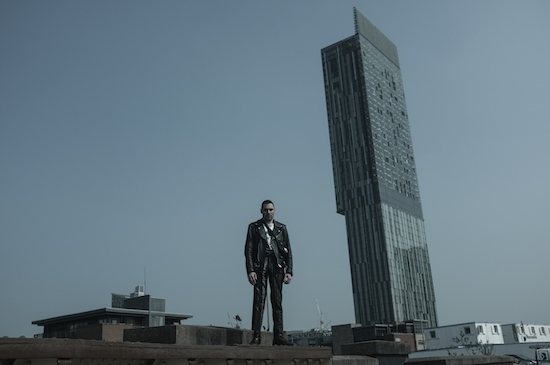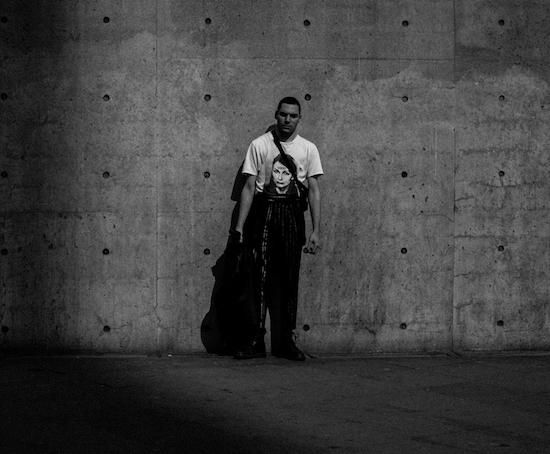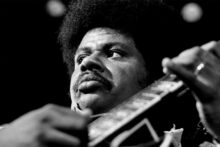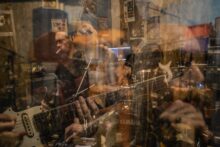Karl D’Silva was born in Rotherham, near Sheffield, South Yorkshire and started taking his first tentative steps as a musician at the age of 11. He grew up in a household where music was always playing and if you look at a list of the music he was into as a schoolboy – Michael Jackson, Billy Idol, Joy Division, David Bowie, Prince, Nirvana, Throbbing Gristle , Cabaret Voltaire, Depeche Mode and T.Rex – it explains several things about him.
Mainly it helps to create some kind of through line connecting all of his different musical endeavours, showing a tendency (quite rightly) to dissolve the ‘boundary’ between ‘high’ and ‘low’ forms; between art and pop.
This magpie tendency as a listener and adaptability as a performer has seen him play in VANISHING, as an auxiliary member of Drunk In Hell and GNOD and perform with Thurston Moore while still producing his own solo work that sounds completely dissimilar again.
He acknowledges the differences not in the form of tension but of alternate worlds that can and should interact, saying: "My thrust from the outset was to make a music which hopefully brings these different worlds together, with melodies that stick in your head but dark lyrics and production with some edge, played and sung with guts."
D’Silva is a resident of the oasis-like Islington Mill – the arts compound in Salford – where he first played improvised music in the early noughties. He then came back to the Mill, playing sax for Drunk In Hell in 2015 where he first met the members of GNOD and the promoters Fat Out. He moved into the Mill the following year and since then has played with Temple Ov BBV and GNOD. He will appear on VANISHING’s next project which is in production now.
Karl D’Silva plays in support to Gentle Stranger and Alexander Tucker at The Quietus Social on Thursday.
From what’s been posted online of your new solo work, it’s markedly different from anything you’ve been involved with as part of a collaboration (Drunk in Hell, VANISHING, Trumpets Of Death, BODYWORK, etc.) Did you think creative control was a necessary freedom to be able to pursue this kind of musical direction?
Karl D’Silva: Yes, definitely. I feel like everything before was always building to me making the sort of music I make as a solo artist. I’m very lucky to have worked with some really great musicians, being able to contribute to the visions of people whose work I truly respect gave me a lot of assurance when I first started to dive within to pull this stuff out of myself. From the moment I took the leap to start writing and singing my own songs it felt like everything just ‘clicked’.
You say that you’re ‘fascinated by the thin veil between the synthetic and the human, between digital and analog’ – what drives this fascination and how do you try and realise it in your music?
KS: Ever since I was a child I’ve always felt like I’m caught between the physical world and some other unseen world that’s in the ether. All the songs feel like they’re coming from somewhere within this nexus point. Nine times out of ten, I will get the melody and chords in my head at the same time with the words coming simultaneously to the music. With the words I’m using lyrical themes and tropes that we’re all familiar with to create vivid images in my mind’s eye, I like being able to ‘see’ the lyric.
In terms of the quote, what it means on a pragmatic level is that I will use anything and everything at my disposal to colour the song. Whether that’s using wild LFO modulation of effects in Ableton, recording a guitar overdub through Dean Honer’s EMS Synthi, or Dean recording my voice through a guitar amp. I’m not a purist with regards to instruments or methods. But above all with my music I have to really feel the emotion vividly and viscerally, I’m not interested in holding anything back.
What was your greatest musical misunderstanding when you were younger?
KS: That there are physical walls/limitations to what we can do, I know how it sounds, but I truly believe that there are none. I got told by a doctor that I’d never be able to play the saxophone due to being born extremely premature and having weak lungs, but I did. So when I see a wall, I hit it until it breaks.

You play multiple instruments but are predominantly a saxophonist – were there any particular figures who drew you to the instrument originally?
KS: John Zorn, John Coltrane, Charlie Parker, Eric Dolphy, Ornette Coleman were the main ones.
When I left school I was studying music at Leeds College of Music though I was still a guitar player at this point. I got Spy Vs. Spy which is John Zorn playing the music of Ornette Coleman out of the library, and that’s THE record that made me specifically want to play the alto. I didn’t start playing one though until I was in my second year of university studying music in York. I practiced like a man possessed and within two years of picking up the saxophone I managed to pass an audition to study it at Guildhall School of Music in London. It still baffles me to this day that they even let me in.
Did you come from a musical family and what were the specific influences of your parents?
KS: My earliest memories are of my parents listening to music. I’ve been singing as long I’ve been able to talk and I’ve been playing instruments since I was about 11. This constant presence and nurturing of the love for music of all persuasions and in all its forms is really due to my Dad who is a serious hi-fi enthusiast and crate digger (now eBay scroller) who has about 5,000 LPs in his collection.
Growing up in a household where music occupied a place of divinity, where it was like the water that we needed to drink in order to stay alive, it’s impossible for me to imagine how I would’ve ended up being anything other than a musician.
Another huge influence aside from my parents was my older cousin Darrell, he used to be a musician in Sheffield’s post-punk scene in the 1980s. He was a saxophone player in The Anti-Group who were an offshoot of Clock DVA, as well as playing in another band called Hula. He got me into loads of music which really informed my musical direction as I was growing up, stuff like Cabaret Voltaire, Throbbing Gristle, DVA, Suicide, Magazine, P.I.L, Brian Eno. He’s extremely knowledgeable about all art forms from poetry to theatre and film and has been a constant guide for me in the nature of what it is to really be a true artist.
You’ve performed with an intimidated cast list of alternative music luminaries – Stephen Mallinder, Thurston Moore, Damo Suzuki, and more. Did they tend to give you free reign to do whatever you felt worked best with the sounds they were created, or were they more instructive?
KS: Playing with Damo was back in 2007 so that’s really difficult to remember. That was with the first group I was involved in called The Gated Community which was an Arkestra-style free-improv big band featuring stalwarts of the northern free improvisation scene. From what I remember it was fly-by-your-pants old fashioned free improv and we played with him twice that year. In 2004, I’d bought Tago Mago when The Grey Area (Mute) reissued it on SACD so it was a mental trip for me and my fellow Rotherham weirdo mates when this gig happened.
Playing with Thurston Moore was while he was in residence at the Islington Mill as part of a group featuring friends David McLean (Tombed Visions), Lauren from Locean as well as Marlene from GNOD. This was a largely freely improvised gig, the whole thing is on Youtube filmed by IMPATV and was the culmination of his residency.
What’s the best piece of advice you’ve ever received from a musician? (And the worst?)
KS: Richard Hawley once said to me, something along the lines of, “You’ve got to wait for your ideas to come to you, don’t force em.” I believe there’s a lot of truth in that. I can only speak for myself, but when I’m writing, the minute I try and force it I lose the flow and everything closes up, writing for me is at its best when you’re really ‘IN’ it and are catching lightning in a bottle. All the worst advice I’ve just ignored and it’s not worth repeating.
In addition to those collaborators already mentioned, you’ve also performed live with fellow Islington Mill residents, the mighty GNOD. Can you try and explain just what it feels like to be onstage with them tearing it up?
KS: I once said that playing saxophone in Drunk In Hell was like trying to have a fight with a supermassive black hole, so I suppose playing with GNOD (at the Rocket Recordings 20 event during ‘Tony’s First Communion’) was like trying to blow out the sun.
The amount of energy onstage is incredible to be a part of in terms of how huge the sound is, you feel like you’re going to die right then and there from the effort required to meet it but as soon as you just let go and relax into being absolutely at the limit of what you can do you can sort of go further than that, couple this with the volume and the energy feedback loop between everyone onstage as well as the feedback loop between band-audience-band and then we’re getting to the point where words start to fail me.
Can you describe the most memorable gig you’ve ever played – where was it and why?
KS: I’ve been playing gigs for over half my life now so to pick one would be almost impossible but playing guitar in the UK premier of Rhys Chatham’s ‘A Crimson Grail’ at Liverpool Cathedral in 2012 was just a beautiful thing.
It’s one of my favourite pieces of music of all time, listening to the album is one thing but being inside that music is extremely difficult to put into words. it was one of the most intensely emotional experiences playing that I’ve ever had, and if you’ll forgive the hyperbole, what I said to Rhys himself was that it sounded like heaven. I’ll never forget it for as long as I’ll live.

You are a tenant of, and demoed your solo work, at Salford’s now rather legendary Islington Mill. How did you come to end up there and what does the place mean to you as a creative artist?
KS: I first came to the Mill when Drunk In Hell played there in February 2015, I was still living in Leeds, and it was a revelation. I knew in my gut that I had to be there and be part of that community and when I was, it truly felt like coming home.
Having the room and space to create was amazing but really it is in the people I’ve met through being at The Mill which has had the biggest impact on me. Gareth Smith of VANISHING, Paddy, Chris, Marlene, Alex and Jon from GNOD, Jamie and Isadora of IMPATV, Al Wilson of GHOLD, The artist Rachel Goodyear, Sam Weaver of Cusp Editions, Michael O’Neill, Amy Horgan of Zim Zum. Having these people in my life as friends and collaborators, being able to have discourse and conversations about process and the work has been a truly wonderful, magical thing.
How is it being a musician in Greater Manchester in 2019? With venues like the Mill pivoting away from live music but venues like The White Hotel springing up on the outskirts plus newer central venues like The Peer Hat and the Kings Arms, is there a sense that things are improving or getting worse?
KS: I think it’s improving as long as new spaces keep opening and things keep changing, stagnation and nostalgia for ‘glory days’ is the enemy of culture.
The most vital thing in the nightlife of a city are the untamed spaces (like The Mill clubspace, The White Hotel, etc.), the places where things can happen that can’t or aren’t allowed to happen anywhere else, places with energy and atmosphere not some slick, clean, boring performative rehash of the idealised past.



